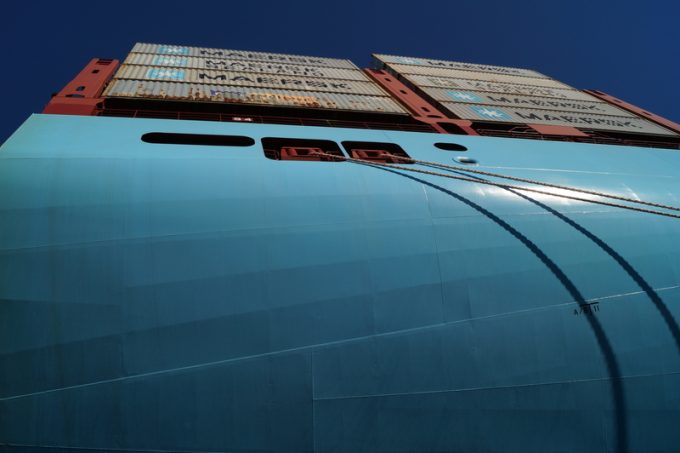Asia-Europe still soaking up new tonnage – but Latin America the market to watch
A total of 2.92m teu of new capacity was added to the global container shipping ...
FDX: ABOUT USPS PRIVATISATIONFDX: CCO VIEWFDX: LOWER GUIDANCE FDX: DISRUPTING AIR FREIGHTFDX: FOCUS ON KEY VERTICALFDX: LTL OUTLOOKGXO: NEW LOW LINE: NEW LOW FDX: INDUSTRIAL WOESFDX: HEALTH CHECKFDX: TRADING UPDATEWMT: GREEN WOESFDX: FREIGHT BREAK-UPFDX: WAITING FOR THE SPINHON: BREAK-UP ALLUREDSV: BREACHING SUPPORTVW: BOLT-ON DEALAMZN: TOP PICK
FDX: ABOUT USPS PRIVATISATIONFDX: CCO VIEWFDX: LOWER GUIDANCE FDX: DISRUPTING AIR FREIGHTFDX: FOCUS ON KEY VERTICALFDX: LTL OUTLOOKGXO: NEW LOW LINE: NEW LOW FDX: INDUSTRIAL WOESFDX: HEALTH CHECKFDX: TRADING UPDATEWMT: GREEN WOESFDX: FREIGHT BREAK-UPFDX: WAITING FOR THE SPINHON: BREAK-UP ALLUREDSV: BREACHING SUPPORTVW: BOLT-ON DEALAMZN: TOP PICK

Maersk’s fleet replacement programme took a step toward completion this morning when it revealed it had ordered 20 new containerships.
The orders, placed with three Chinese and South Korean shipyards, will see the “fleet renewal” project finalised when the vessels are delivered between 2028 and 2030.
In August, Maersk unveiled plans to acquire another 800,000 teu in vessel capacity, through a combination of owned ships and long-term charters.
“Maersk has now finalised these charter contracts across several tonnage providers”, it said, adding that these deals covered some 500,000 teu in capacity and, “when phased in, the charter vessels will replace existing capacity”.
The 20-vessel order announced today comprises: six 17,000 teu vessels and two of 9,000 teu to be built at China’s Jiangsu Yangzijiang shipyard; six 15,000 teu ships from South Korean yard Hanwha Ocean; and six, also of 15,000 teu, from China’s New Times Shipbuilding.
“We are pleased to have signed agreements for 20 vessels and thereby completed the acquisition of 300,000 teu capacity, as announced in August,” Anda Cristescu, head of chartering & newbuilding at Maersk, said.
“These orders are a part of our ongoing fleet renewal programme and in line with our commitment to decarbonisation, as all the vessels will have dual-fuel engines, with the intent to operate them on lower-emissions fuel,” she added.
And she reiterated that the newbuildings were part of a replenishment strategy, rather than adding to Maersk’s total fleet capacity of around 4.4m teu.
“Due to their different sizes, the vessels will be able to fill many roles and functions within our future network and give us a lot of deployment flexibility when they are ready to enter our fleet. Once phased in, they will replace existing capacity in our fleet,” she explained.
According to Alphaliner, the Danish carrier already had 34 vessels under construction, amounting to a combined 474,500 teu of capacity and representing 10% of its existing capacity. Today’s order takes that number to 54, for a combined capacity of 775,000 teu, and takes Maersk’s fleet-to-orderbook ratio up to 17.6%.
Its current fleet of owned and chartered ships numbers 720 – 333 of which are owned, with, according to vesselsvalue.com, 47 of these over 20 years of age.
Prior to today’s announcement, Maersk’s most recent order was for eight 16,000 teu dual-fuel ships from New Times, which, vesselsvalue.com estimates, are worth $200m each, implying that today’s order represents a total investment of around $4bn.
Comment on this article